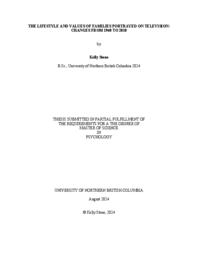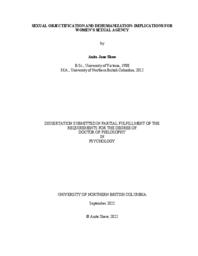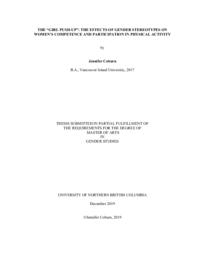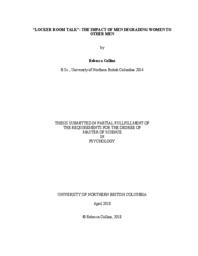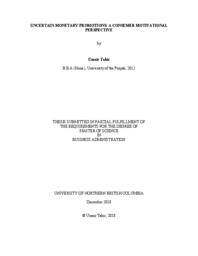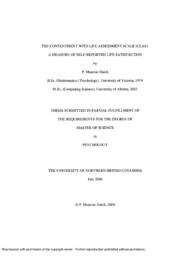Lavallee, Loraine
Person Preferred Name
Loraine Lavallee
Related Works
Content type
Digital Document
Origin Information
Content type
Digital Document
Description / Synopsis
While ideally sexual activities would only take place when mutually desired, many women participate in sex that they do not want. During their lifetimes, between 18% and 25% of women will experience rape or attempted rape, and 50% or more will experience some form of unwanted sexual activity (Gavey & Senn, 2014). The present research tests whether women’s ability to exercise sexual agency is undermined when her internal sense of humanness has been diminished by others thinking of and treating her like an object. In patriarchal cultures, women are chronically sexually objectified: represented as sexual objects, existing primarily for men’s sexual use. Conceptually, objectification implies dehumanization and previous research has found that when people evaluate another person’s appearance, they dehumanize women but not men (Heflick et al., 2011). When women or men are dehumanized by others, they self-dehumanize (i.e., experience diminished human characteristics and feel more object-like) (Andrighetto et al., 2018; Baldissarri et al., 2017; Bastian & Haslam, 2010; Loughnan et al., 2017) and experience diminished agency (Andrighetto et al., 2018; Baldissarri et al., 2017). Building on this previous research, the present research has two goals. Study 1 tests whether women are more commonly viewed as less human than men. In Study 2, experiences of being dehumanized were then examined as a cause of diminished agency (self-reported self-efficacy and sexual agency) due to self dehumanization. Women and men do not experience dehumanization equally. When people focus on another person’s appearance, women are viewed as less human than men; when instructed to focus on their performance or on them as a person, women and men are not viewed differently (Heflick et al., 2011). The conclusion from this research was that women are viewed as less human than men when the focus is on their appearance. Study 1 of the present research tested an alternate hypothesis: that women are generally viewed as less human than men except when the focus is on their personhood. Before viewing a video featuring either a woman or a man, participants were either given no instructions or were asked to focus on one of three things: the subject’s appearance; the subject as a person; or the video. Consistent with the hypothesis, when given no instructions, participants viewed the women as less human than the men (i.e., lower on competence and human characteristics). Study 2 then examined whether being dehumanized impacts women’s sense of their own humanness and, consequently, their sense of agency. After recalling either an experience of having their appearance evaluated by others or an experience of being treated primarily as an instrument in the workplace, women and men rated their internal feelings of humanness. Moderated mediation analyses demonstrated that both situations caused women and men to self-dehumanize and in turn report lower self-efficacy. Contrary to predictions, however, self-dehumanization did not diminish either women’s or men’s sexual agency. Challenges examining sexual agency are discussed.
Origin Information
Content type
Digital Document
Description / Synopsis
In complex industrialized societies, it is virtually impossible for individuals to know the environmental impact of their consumption. A personal cap and trade system, which assigns citizens limited, tradable allocations of pollution (e.g., carbon pollution), can link individuals directly to their environmental impact and enable them to chart a path to sustainable living. To explore public reactions to this system, an Amazon Mechanical Turk sample of individuals residing in Canada viewed a video describing either a carbon tax system or a personal cap and trade system. A personal cap and trade system based on allocations of kilograms of carbon dioxide equivalents (kgCO2e) was viewed as significantly more likely than carbon taxes to enable Canadians to reduce their carbon consumption and to live more sustainably. A range of public concerns that might limit support for carbon pricing systems were identified with qualitative analysis of participant comments about the systems.
Origin Information
Content type
Digital Document
Description / Synopsis
Men are stereotyped as more physically competent than women. The stereotyping of women’s poor performance creates the conditions for stereotype threat. Stereotype threat, the fear of confirming a stereotype, can undermine women’s performances and participation in sports. Stereotype threat, however, has not been tested in strength-building activities. The present study experimentally tests whether stereotype threat undermines women’s willingness to perform unmodified push-ups and undermines their push-up performance. Women were assigned to four conditions: a stereotype-threat condition, an implicit stereotype-threat condition, a relief condition, and a control condition. Under stereotype threat, women were expected to choose modified over unmodified push-ups and, among those performing unmodified push-ups, to complete fewer push-ups than women in the other conditions. These hypotheses were not supported. During debriefings, women described their experiences related to push-ups and strength training. A thematic analysis of women’s debriefings offers insight into the gender complexities of women’s engagement with strength training.
Origin Information
Content type
Digital Document
Origin Information
Content type
Digital Document
Origin Information
Content type
Digital Document
Origin Information
Content type
Digital Document
Origin Information
Content type
Digital Document
Origin Information

